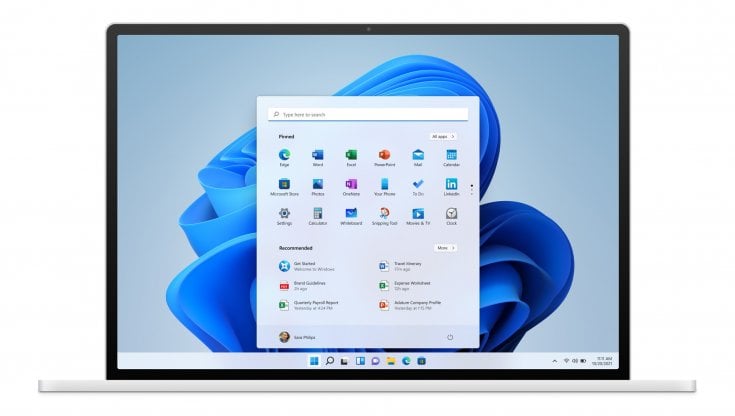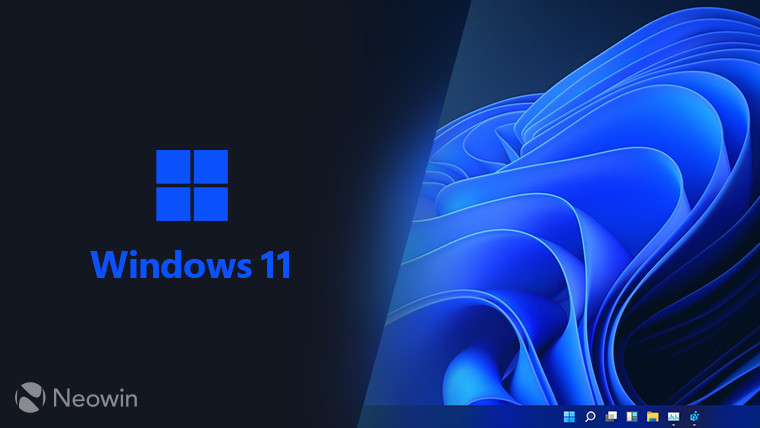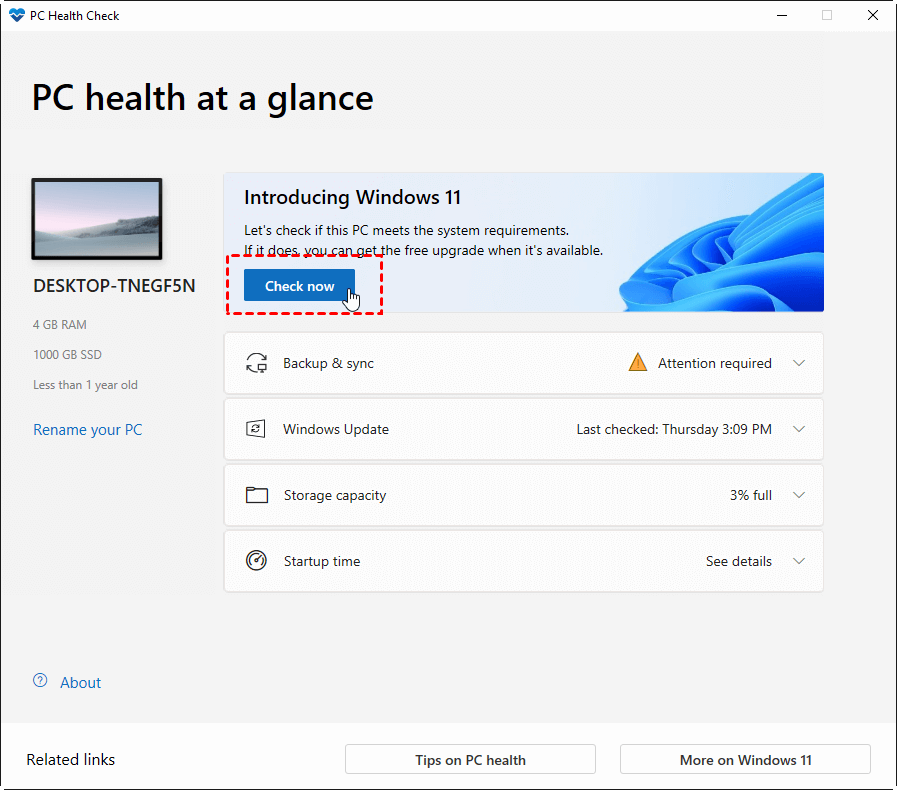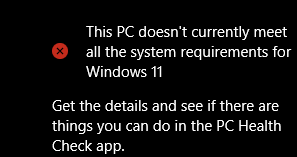Wondering if your CPU can run Windows 11? Checking the system requirements is the first step. If your processor meets the criteria, you’ll be ready to upgrade without any issues.
Yes, your CPU can run Windows 11 if it’s at least 1 GHz, 64-bit, and has TPM 2.0. Check your CPU’s specs or use the PC Health Check tool to see if it fits. If not, you might need to upgrade.
Stay tuned as we explore whether your CPU can run Windows 11. We’ll dive into all the details on “can my CPU run Windows 11” next!
Can My CPU Run Windows 11?
Yes, your CPU can run Windows 11 if it meets the minimum requirements: a 1 GHz or faster processor and 64-bit support. Check your CPU model and compare it with Windows 11’s requirements to be sure. If your CPU doesn’t meet these standards, you may need to upgrade.
How Do I Check If My CPU Supports Windows 11?

Check System Requirements:
Open the Settings app on your PC and go to “System” > “About.” Look for information on your CPU’s speed and bit version to see if it meets Windows 11’s minimum requirements.
Use the PC Health Check Tool:
Download and run the PC Health Check tool from Microsoft’s website. This tool will scan your system and tell you if your CPU supports Windows 11.
Look Up CPU Specifications:
Search online for your CPU model’s specifications. Compare these specs with Windows 11’s requirements, which include a 1 GHz or faster CPU and 64-bit support.
Read: Windows 11 AMD CPU Compatibility List – Upgrade For Windows 11 Now!
What CPUs Are Compatible With Windows 11?
Windows 11 supports CPUs from Intel’s 8th generation and newer, as well as AMD Ryzen 2000 series and newer. You can check the exact list on Microsoft’s website to confirm if your specific CPU model is compatible.
What If My CPU Is Not Compatible With Windows 11?
If your CPU isn’t compatible, you may need to upgrade it. You can choose a new CPU that meets the requirements or consider using Windows 10, which will continue to receive updates until October 2025.
Can I Install Windows 11 On An Unsupported CPU?
No, you cannot officially install Windows 11 on an unsupported CPU. While there are unofficial methods, they can cause security risks and performance issues. It’s best to use a CPU that meets Windows 11’s requirements for a stable and secure experience.
How Can I Upgrade My CPU For Windows 11?
To upgrade your CPU, first, choose a compatible one from the list of supported CPUs. Then, install the new CPU in your computer, making sure to update your BIOS and drivers. If you’re unsure, consider seeking help from a professional.
Is Upgrading My CPU For Windows 11 Worth It?
Yes, upgrading your CPU for Windows 11 is worth it if you want the latest features and security updates. It ensures your computer runs smoothly and stays up-to-date. If your current system meets your needs and works well, you might not need to upgrade right away.

Are There Workarounds To Install Windows 11 On An Unsupported CPU?
There are unofficial methods to install Windows 11 on unsupported CPUs, but they come with risks like instability and lack of updates. It’s safer to upgrade your hardware to meet the official requirements for a reliable Windows 11 experience.
What Should I Do If My CPU Can’t Run Windows 11?
Stick with Windows 10:
Continue using Windows 10, which will still get updates until October 2025. It will keep your system secure and functional.
Upgrade Your CPU:
Consider buying a new CPU that meets Windows 11 requirements. Make sure it’s compatible with your motherboard and other components.
Upgrade Your Entire PC:
If upgrading just the CPU isn’t enough, think about getting a new PC that meets Windows 11’s specs. This can also improve overall performance.
Use Alternative Software:
Look for other software that meets your needs and works with your current system. You may find options that suit your work without needing Windows 11.
Check for Compatibility Updates:
Occasionally check if Microsoft updates its compatibility list or tools. Sometimes, new updates might add support for older hardware.
Read: Do I need To Reinstall Windows With New CPU – Explore For All the Details!
How Can I Optimize My CPU For Windows 11?
Update Drivers and BIOS:
Ensure that your CPU drivers and BIOS are up-to-date. This can improve performance and compatibility with Windows 11.
Manage Startup Programs:
Disable unnecessary startup programs in Task Manager. This reduces the load on your CPU and speeds up boot time.
Adjust Power Settings:
Set your power plan to “High Performance” in the Control Panel. This ensures your CPU runs at its best performance.
Clean Up Your System:
Remove old files and programs you don’t use. Use built-in tools like Disk Cleanup to free up system resources.
Monitor CPU Usage:
Use Task Manager to check CPU usage and identify any programs that use a lot of CPU power. Close or manage these programs to improve overall performance.
What Is The Minimum CPU Speed Required For Windows 11?
Windows 11 requires a CPU with a minimum speed of 1 GHz. It must also be 64-bit and have at least 2 cores. If your CPU meets these specifications, it should be able to run Windows 11 smoothly.

Do I Need A 64-bit CPU For Windows 11?
Yes, Windows 11 requires a 64-bit CPU. This is because 64-bit processors handle more memory and perform better with modern software. A 32-bit CPU will not meet the requirements for Windows 11.
Can I Run Windows 11 On A Dual-Core CPU?
Yes, you can run Windows 11 on a dual-core CPU as long as it meets other requirements, such as having a speed of 1 GHz or faster and being 64-bit. More cores can improve performance, but dual-core processors are sufficient.
How Do I Find My CPU Model To Check For Windows 11 Compatibility?
You can find your CPU model by opening Task Manager and going to the “Performance” tab. Look under “CPU” to see your processor details. You can then check these details against Windows 11’s system requirements.
Can A Laptop CPU Run Windows 11?
Yes, a laptop CPU can run Windows 11 if it meets the system requirements. Ensure your laptop’s CPU is 64-bit, has at least 1 GHz speed, and is from a supported generation to confirm compatibility.
Read: Windows 11 Intel CPU Compatibility List – Complete Guide Of 2024!
Will Windows 11 Run On A CPU Without TPM 2.0?
No, Windows 11 requires TPM 2.0 for security features. Without TPM 2.0, you cannot officially install or run Windows 11. TPM 2.0 helps protect your data and ensure system security.
How Can I Check If My CPU Has TPM 2.0?
To check if your CPU has TPM 2.0, press `Win + R`, type `tpm.msc`, and hit Enter. This opens the TPM Management tool, where you can see if TPM 2.0 is available and enabled on your system.
Does Windows 11 Work With All Intel CPUs?
No, Windows 11 does not work with all Intel CPUs. It requires Intel CPUs from the 8th generation or newer. Older models are not supported due to hardware and performance requirements.
Does Windows 11 Support AMD CPUs?
Yes, Windows 11 supports AMD CPUs, but it requires AMD Ryzen 2000 series or newer. Earlier AMD CPUs do not meet the necessary system requirements for running Windows 11.
What If My CPU Meets Some But Not All Windows 11 Requirements?
If your CPU meets some but not all requirements, Windows 11 might not be installable. You may need to upgrade your CPU or other hardware to fully meet the system requirements for a proper installation.

Read: Do I Need CPU Drivers – Essential Tips for Your PC!
Frequently Ask Questions:
1. Can I Run Windows 11 If My CPU Is Overclocked?
Yes, you can run Windows 11 with an overclocked CPU, but ensure stability and cooling to avoid issues.
2. What Type Of CPU Cooling Is Needed For Windows 11?
Standard CPU cooling is sufficient. Ensure your cooling solution keeps temperatures low to maintain stable performance.
3. Does Windows 11 Require A Specific CPU Brand?
No, Windows 11 does not require a specific CPU brand. It supports both Intel and AMD CPUs that meet the specs.
4. Can Windows 11 Be Installed On A CPU With Integrated Graphics?
Yes, Windows 11 can run on CPUs with integrated graphics as long as they meet the system requirements.
5. How Do I Check If My CPU Supports DirectX 12 For Windows 11?
Check your CPU’s specs online or use the DirectX Diagnostic Tool (`dxdiag`). Look for DirectX 12 support in the list.
6. Can I Use Windows 11 On A CPU With a Lower Clock Speed But High Cores?
Yes, Windows 11 can run on CPUs with lower clock speeds but more cores, provided other requirements are met.
7. How Can I Upgrade My Motherboard To Support Windows 11?
Choose a compatible motherboard that meets Windows 11 requirements. Install it and update drivers to ensure full support.
8. Does Having More RAM Affect Windows 11 CPU Requirements?
More RAM improves performance but does not change CPU requirements. Ensure your CPU meets the minimum specs for Windows 11.
9. Can Windows 11 Run On A CPU From A Custom-Built PC?
Yes, Windows 11 can run on CPUs from custom-built PCs if they meet the official system requirements.
10. What BIOS Settings Should I Check For Windows 11 Compatibility?
Check that TPM 2.0 and Secure Boot are enabled in the BIOS. These settings are required for Windows 11.
Conclusion:
In conclusion, to run Windows 11, your CPU must meet specific requirements, including being 64-bit and at least 1 GHz. Check your CPU’s specifications and use tools like Microsoft’s PC Health Check to confirm compatibility. If your CPU doesn’t meet these requirements, consider upgrading your hardware or sticking with Windows 10 until you can.
Related Posts:
- Can You Use A CPU Cable For GPU – Comprehensive Guide_ 2024!
- Question About % CPU From Top Command – A Complete Guide Of 2024!
- Very High CPU Load, But Nothing Significant In Top – Ultimate Guide 2024!
- Can’t Understand CPU Utilisation During MD Resync – Complete Guide – 2024!
